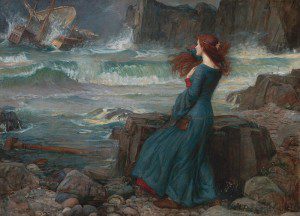
“Miranda — The Tempest” (1916)
Click to enlarge.
Notwithstanding my fear that doing so will drive my critics still further into madness, I here disclose that my wife and I have just watched the 2010 film version of Shakespeare’s The Tempest. That’s two Helen Mirren films in two nights. (See here for last night’s.)
I have mixed feelings about the production. Mirren is wonderful, of course, as Prospera (yes, Prospera), and several of the other actors are also quite good. But the film was more than a bit noisy, the score was sometimes off-putting, and the pacing was occasionally strange.
Still, it’s Shakespeare. And I notice something new in every Shakespearean production that I see. Even in the terrible ones. (This one doesn’t fall into that class.) Even a bad cast or a poor director can bring out something fresh, if only, sometimes, through incompetence.
There is simply nobody more eloquent than Shakespeare (or Oxford, or whoever it was) at his best.
Here he is, as many students think, reflecting on the end of his writing career and on his own mortality:
Our revels now are ended. These our actors,
As I foretold you, were all spirits and
Are melted into air, into thin air:
And, like the baseless fabric of this vision,
The cloud-capp’d towers, the gorgeous palaces,
The solemn temples, the great globe itself,
Ye all which it inherit, shall dissolve
And, like this insubstantial pageant faded,
Leave not a rack behind. We are such stuff
As dreams are made on, and our little life
Is rounded with a sleep.
The Tempest IV.i.1879-1889
Posted from Park City, Utah











